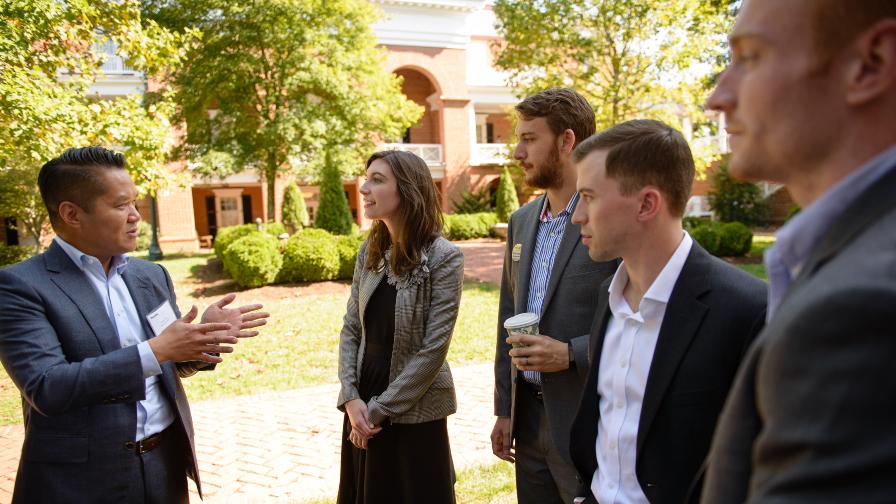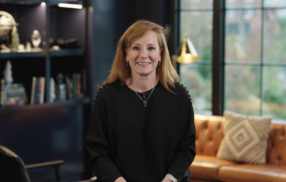
Industries in Focus: Where Darden Grads Go to Do Their Best Work
By Jay Hodgkins
From health care to real estate to consumer packaged goods, University of Virginia Darden School of Business graduates in the Class of 2019 accepted jobs across 15 industries after graduation. At Darden, on-Grounds and off-Grounds recruiting opportunities lead to a wealth of potential career paths.
However, there’s no question that three industries in particular have drawn the most interest and hired the most graduates in recent years, including the Class of 2019: consulting, financial services and technology.
When Darden released its 2019–20 Employment Report in September — announcing record salaries, signing bonuses and percentage of graduates receiving job offers — it revealed that three-quarters of its most recent graduates landed in one of those three fields. Here’s a closer look at how finding a career in each of those fields works at Darden.
Consulting
More than 35 percent of Darden’s full-time MBA Class of 2019 accepted a job in consulting within three months of graduating, securing a mean base salary of $152,881, as compared to $135,168 for the class across all industries.
Consulting firms also represented six of the Top 10 employers for the class, with Boston Consulting Group in first, hiring 22 graduates, followed by McKinsey with 19, Bain with 13, Accenture with 11, Deloitte with seven and PricewaterhouseCoopers Strategy& with seven.
One aspect drawing graduates to the field? The varied work and supportive culture.
During a Consulting Conference panel discussion in October featuring four recent graduates working in the field, panelists said their companies had strong onboarding procedures and responsive networks that helped set new hires up for success.
Katherine Duncan (MBA ’18), a consultant at EY-Parthenon, said she was paired with a case team leader at the outset of her career, and worked exclusively under the direction of that manager for the first six months. The initial period gives the case team leader the opportunity to ensure exposure to multiple workstreams and direct them to areas where they can have the most impact, Duncan said.
Dana Gusky (MBA ’18), a senior strategy consultant at Accenture, said the company dedicated significant resources to new hires, and said connecting with the strong Darden network at Accenture helped her understand the firm and where the compelling staffing opportunities were.
“They do a great job of making you feel part of the team,” Liz de Saint Phalle (MBA ’18), a senior associate at PwC, said of her company, noting access to coaches and mentors. “Having that support system is really helpful.”
The PwC consultant lives in New York City but has been working on a project in the San Francisco Bay Area, meaning cross-country commutes are common. The schedule can be challenging, but managers understand the need for flexibility in how, when and where people work.
Panelists said absorbing knowledge about new companies and industries quickly — going from “newbie to expert” in a matter of weeks, as one panelist put it — and the intense bonding with committed teams were among the most enjoyable aspects of the job.
Aside from the School’s powerful network in the industry and a wealth of on-Grounds recruiting opportunities, Darden Career Development Center (CDC) Senior Director Christy Gunville focuses on helping guide students aspiring to consulting jobs into the field each year.
Financial Services
More than 24 percent of the Class of 2019 took a role in financial services — a designation that includes everything from investment banking to asset management and private equity to consumer banking and credit cards.
Graduates entering financial services jobs secured a mean base salary of $135,278, and JPMorgan Chase was the top hiring company in the industry, bringing on eight new Darden grads.
The CDC ensures students have a number of opportunities to get their foot in the door with top finance companies each year, from a well-structured recruiting process on Grounds for banking careers to job treks to destinations such as New York City for the School’s annual Week on Wall Street; Charlotte, North Carolina; and Boston. Led by CDC senior directors Ed Yu and Paul Reeder, these treks to finance hot beds give students a firsthand look inside a variety of organizations and allow them to establish a network in fields with a less defined recruiting process such as private equity, venture capital and other areas of asset management.
This year, Darden’s Week on Wall Street takes place later in October with 56 students traveling to New York to visit 14 companies.
“Week on Wall Street is an opportunity for Darden students to visit the bank’s office and see the bankers in their natural habitat or element,” said Yu, who specializes in investment banking career support. “Students will be able to demonstrate interest to their top banks and meet with a number of senior bankers who may not have had the chance to come down to Darden and build rapport with the recruiting team.”
Tech
Exactly 15 percent of Darden’s 2019 class accepted a job in the technology industry within three months of graduating, bringing home a mean base salary of $121,704. Top employers of Darden grads in the sector included Amazon, which hired 13 students from the class, and Microsoft, which hired seven.
Tech recruiting has grown rapidly in recent years at Darden, with industry juggernauts such as Google, Amazon and Microsoft all traveling to the School to hold on-Grounds recruiting events.
As an increasing number of Darden students in recent years have sought their MBA as a means to pursue a career transition into tech, the School also holds a number of events and programs to introduce students to the industry and help them understand which career opportunities might be right for them.
In early October, the annual Darden Tech Week was kicked off by Amazon, which brought recruiters to Grounds and also led a session on how to build a product roadmap. Mastercard also led a session on leveraging technology to transform digital identity and financial inclusion.
Darden professors, from Lalin Anik of the Marketing area to Bobby Parmar of the Strategy, Ethics & Entrepreneurship area to Alex Cowan of the Technology and Operations Management area, presented on the wide range of ways technology is influencing business and society.
“Our students have no limit to where they can go in tech. We have grads launching their careers in sales, operations, account management, data analytics, product management, finance, marketing; you name it,” said CDC Senior Director Jenny Zenner, who leads career support for the tech industry. “Additionally, our technology partners appreciate the value of our international candidates who provide a global perspective to their teams.”
The University of Virginia Darden School of Business prepares responsible global leaders through unparalleled transformational learning experiences. Darden’s graduate degree programs (MBA, MSBA and Ph.D.) and Executive Education & Lifelong Learning programs offered by the Darden School Foundation set the stage for a lifetime of career advancement and impact. Darden’s top-ranked faculty, renowned for teaching excellence, inspires and shapes modern business leadership worldwide through research, thought leadership and business publishing. Darden has Grounds in Charlottesville, Virginia, and the Washington, D.C., area and a global community that includes 18,000 alumni in 90 countries. Darden was established in 1955 at the University of Virginia, a top public university founded by Thomas Jefferson in 1819 in Charlottesville, Virginia.
Press Contact
Molly Mitchell
Senior Associate Director, Editorial and Media Relations
Darden School of Business
University of Virginia
MitchellM@darden.virginia.edu







